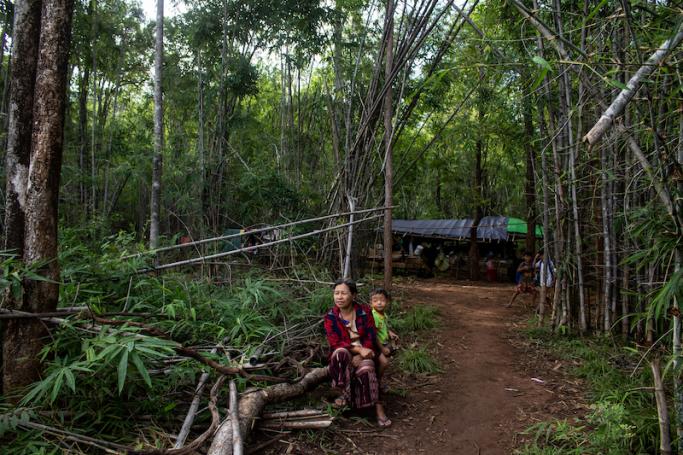Relentless attacks by the military junta throughout Myanmar in the past few weeks have caused the already dire displacement and humanitarian situation further devastation inside the country, according to the humanitarian organisation, Progressive Voice.
The root cause of the displacement has been the Myanmar military and its decades-long oppression in ethnic minorities areas, which have expanded to Bamar-majority areas in central Myanmar following the attempted coup. Its ongoing atrocity crimes are only deepening the humanitarian crisis.
Progressive Voice says that without immediate and concrete actions by the international community to hold the military junta accountable for its atrocities, it will only be emboldened to continue heinous crimes with blanket impunity.
In southeastern Myanmar, fighting between the junta and democratic resistance forces in Thayatchaung Township of Tanintharyi Region has displaced more than 5,000 villagers since 8 June 2023. Junta soldiers not only launched targeted attacks against the resistance forces, but also indiscriminately used at least 30 villagers as human shields, including children and elderly people.
A little further north, on 7 June 2023, the junta’s deliberate artillery shelling on villages in Kyaukgyi Township, Bago Region, has displaced over 10,000 people. Due to their protracted displacement, in an area of 4,000 acres people cannot grow their crops, thus risking shortages of food supplies for conflict-affected populations. With the monsoon season already starting, the situation of displaced people who already have acute needs for shelter, food, medicines and other essentials are made even more drastic. They urgently need emergency support.
Similarly, in central Myanmar, which has become a stronghold of the people’s revolutionary forces, the military junta’s intensifying attacks have spiked the number of displaced populations.
On 9 June 2023, junta troops launched both aerial and ground attacks in Salingyi Township of Sagaing Region displacing, an estimated 5,000 people from ten villages. Hundreds of houses were destroyed due to the junta troops ’torching of people’s homes following the attacks.
On 9 June, the junta troops entered a village in Khin-U Township, also torched villagers ’houses and took their properties and livestock, including 50 sheep and six cows. These incidents are examples from just the past few weeks of the junta’s nationwide terror campaign against the people of Myanmar.
Such destruction of property, food storage and looting of livestock, on top of the junta’s use of artillery shelling and airstrikes in parallel with arson attacks to intentionally target civilian areas have been a pattern, as the resistance movement has continued to gain momentum on the ground.
Local communities and vulnerable populations have faced fresh and protracted displacement over the past two years, with at least 1.5 million displaced since the attempted coup. This is in addition to the existing number of displaced populations in ethnic regions and refugees in neighboring countries like Thailand and Bangladesh prior to the military’s attempted coup. Such acts of the military junta are not stopping any time soon.
While the escalation of atrocity crimes against civilians continues, the junta has started processing the repatriation of Rohingya refugees from Bangladesh, starting with its “pilot project”. Meanwhile, in Rakhine State where Rohingya refugees are supposed to return, the junta blatantly continues to block the life-saving humanitarian assistance from reaching populations devastated by Cyclone Mocha in areas under its control. The situation and conditions are clearly not ready for the Rohingya’s safe, voluntary, sustainable and dignified return.
Given the current humanitarian crisis – caused by Cyclone Mocha and the junta’s ongoing atrocity crimes against the people – the “pilot project” reeks of the junta’s routine manipulation tactic to falsely claim legitimacy and the classic weaponization of aid, according to Progressive Voice.
Recently, the Special Rapporteur on the human rights situation in Myanmar, Tom Andrews, has called on Bangladesh to urgently stop the repatriation project. He stated, “Conditions in Myanmar are anything but conducive for the safe, dignified, sustainable, and voluntary return of Rohingya refugees.”
Despite this, Bangladesh and the UN High Commission for Refugees (UNHCR) are allowing the junta to move forward with its plan. Furthermore, according to the news agency, RFA, the UNHCR has cut food rations for the 23 Rohingya refugees who registered for repatriation although their return has not yettaken place yet. This action is clearly a proof of UNHCR’s complicity in the pilot project, and the repatriation will not be voluntary.
The worsening displacement and humanitarian crisis in Myanmar will endure if the international community continues to fail to respond and hold the military junta accountable for its heinous crimes. The catastrophe in Myanmar needs to be immediately addressed in an effective and concrete manner by respecting and supporting the voices of the people on the ground. The Spring Revolution, the democratic resistance movement and the people’s determination for federal democracy will continue despite the junta’s ongoing brutal attempt for power grab.
It is time for the international community to support the Myanmar people in the realization of their will for a federal democratic country. The international community must take all actions possible to bring about the end of the military junta by dismantling this criminal institution and holding the junta leaders to account by international law. Meanwhile, the international community must support and partner with local responders and ethnic humanitarian organizations to deliver the desperately-needed humanitarian assistance, without channeling it through or partnering with the junta, to ensure humanitarian support reaches the displaced populations in time to save lives.












